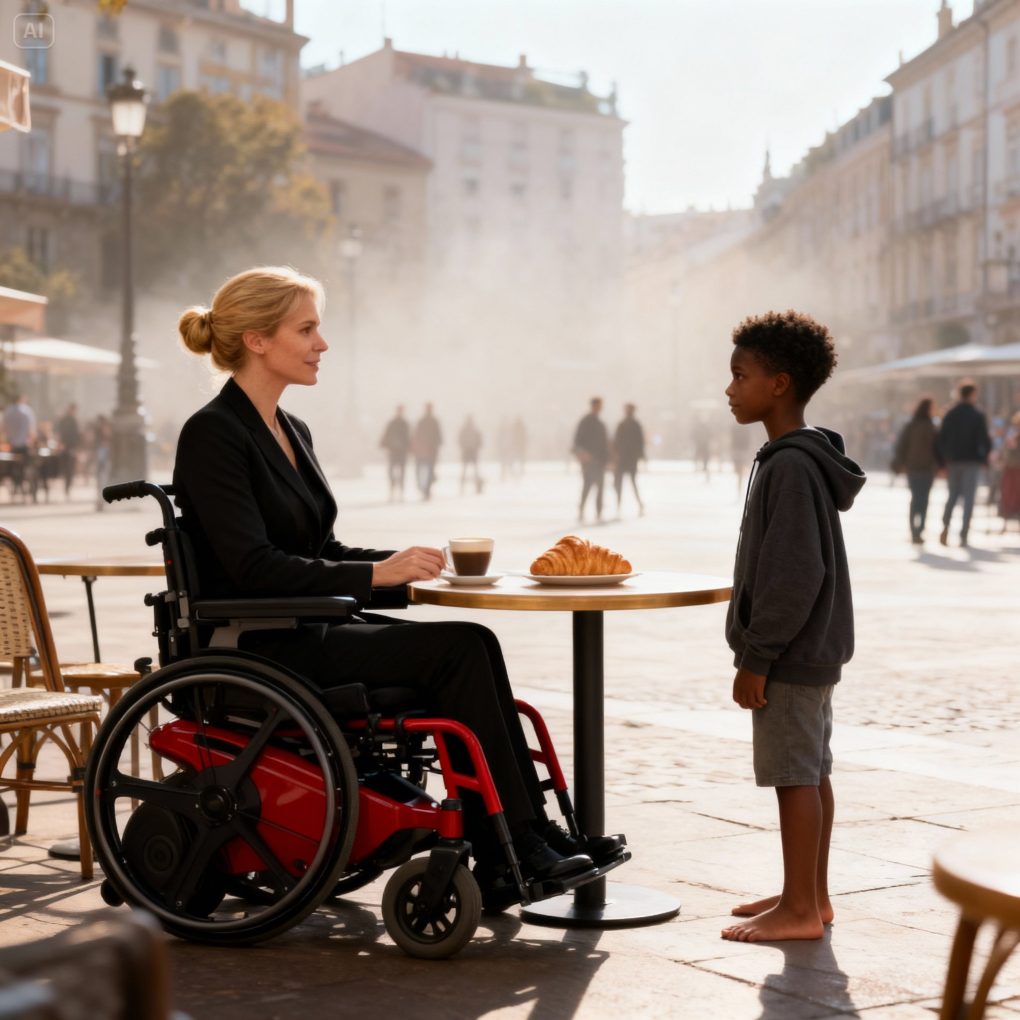The poor black boy asked the paralyzed billionaire: “I can cure you, just give me that plate of leftovers!” She smiled and…
The poor black boy asked the paralyzed billionaire: “I can cure you, just give me that plate of leftovers!” She smiled and…
Everyone on the terrace watched as the boy approached her table.
It was a sunny afternoon at the most exclusive seaside restaurant in Miami. Billionaire tech magnate Victoria Hayes sat in her wheelchair, her legs motionless since a plane crash three years ago. Her assistant stood nearby, guarding her space like a wall between wealth and the rest of the world.
Then a boy appeared. Thin, barefoot, maybe ten or eleven years old. His clothes were faded, his skin glistened with sweat, and his eyes—deep, clear, and intelligent—locked onto Victoria’s plate of untouched leftovers.
“Ma’am,” he said softly, “if you give me that plate, I can help you walk again.”
The restaurant went silent.
The waiter froze. The assistant barked, “Get away, kid!” But Victoria raised a hand. There was something in his voice—steady, certain, not the sound of begging.
She smiled faintly. “You can cure me?” she said, amused. “Do you know who I am?”
“Yes,” the boy replied calmly. “You’re the lady everyone says can buy anything. But I can give you something money can’t.”
Her assistant snorted. “He’s delusional.”
Victoria’s lips curved. “Alright then,” she said. “You want my leftovers? Prove it. Tell me how you’ll cure me.”
The boy looked her straight in the eye. “You forgot how to walk,” he said softly, “because you forgot what it feels like to stand for someone else.”
Her smile vanished. The words hit her harder than she expected. Around her, whispers rippled through the restaurant, but she couldn’t look away from the boy’s calm, piercing gaze.
She pushed the plate toward him. “Take it,” she said quietly. “Tell me more.”

They met again the next day—by Victoria’s own choice. Her assistant protested, but she insisted. “Find that boy,” she said. “His name’s Elijah, right?”
He arrived timidly at her mansion by the sea, clutching a small backpack. “You didn’t have to call me,” he said.
Elijah nodded. “Not like a doctor,” he said. “I can’t fix your legs. But I can fix what’s heavier than them.”
Victoria frowned. “And what’s that?”
“Your heart,” he said simply. “You stopped using it when you started counting money instead of people.”
She didn’t reply. He walked toward her garden, motioning for her to follow. Her nurse pushed her chair behind him. “Close your eyes,” Elijah said. “Listen.”
At first, she heard only waves and wind. Then, faintly—laughter. From behind the walls of her mansion came voices she hadn’t heard in years: children playing at the charity center she once funded, before she stopped caring.
Elijah knelt beside her. “You gave those kids a future once. Then you stopped coming. They thought you forgot them.”
Her throat tightened. “I—”
“You wanted to walk again,” Elijah said. “Start by walking back to where you left your kindness.”
For the first time in years, tears fell down her cheeks.
The next morning, Victoria returned to that same community center. The children gasped when they saw her—older, thinner, but smiling again. She stayed for hours, talking, laughing, listening.
And that night, when she tried to move from her wheelchair to her bed, something unbelievable happened—her right leg twitched.
Doctors called it a “neurological response.” Victoria called it a sign.
Over the next few weeks, she met Elijah every day. He taught her to help without cameras, to give without announcements. Together, they rebuilt playgrounds, paid for school lunches, and funded a free clinic for the families of the city’s poorest neighborhoods.
Each time she lifted a box or reached out to comfort someone, the numbness in her legs faded a little more.
One afternoon, as Elijah was painting a mural, Victoria stood behind him—on her own feet. She gasped, gripping a railing, tears filling her eyes.
Elijah turned, grinning. “I told you,” he said softly. “When your heart stands, your legs follow.”
From that day on, she walked again—slowly, unevenly, but proudly.
She offered Elijah a scholarship, a home, anything he wanted. But he only smiled. “You already gave me everything,” he said. “You saw me.”
Years later, people would tell the story of how the richest woman in Miami was healed by a hungry boy who asked for leftovers. And Victoria would always reply the same way:
“He didn’t heal my body. He healed my soul.”
If you believe compassion can do what medicine can’t, share this story. Because sometimes, the smallest act of kindness is the miracle someone’s been waiting for.
The wife was forced by her husband to sign divorce papers in the hospital, but 3 years later she returned with a child and power that made him regret it for the rest of his life…
The wife was forced by her husband to sign divorce papers in the hospital, but 3 years later she returned with a child and power that made him regret it for the rest of his life…
The beeping of hospital machines echoed softly in the sterile room. Sarah Mitchell lay weak in the bed, pale from the difficult childbirth she had endured just hours before. The baby she had dreamed of holding was gone — stillborn. Her eyes were empty, her heart hollow. Beside her stood her husband, Daniel, impeccably dressed in a tailored suit, holding a pen and a stack of papers.
“Sign them,” he said coldly.

Sarah blinked slowly, confused. “What… what are these?”
“Divorce papers,” Daniel replied without hesitation. “There’s no point in continuing this marriage. You couldn’t even give me a child. I’m done.”
Her trembling fingers clutched the blanket. “Daniel, please… I just lost our baby. You can’t do this now.”
He crossed his arms. “You’ve been nothing but a disappointment. I’ve wasted five years of my life with you. The least you can do is make this easier.”
A nurse standing nearby frowned. “Sir, this isn’t appropriate. She just gave birth.”
Daniel ignored her, his tone growing sharper. “Sign it, Sarah. Or I’ll leave you with nothing.”
Her tears soaked the paper as she forced her shaking hand to move. She signed. The nurse whispered softly, “You don’t have to do this,” but Sarah just looked out the window, the world outside a blur of light and pain.
Daniel snatched the documents and turned toward the door. “Goodbye, Sarah. I’m getting what I deserve — a real family, with someone who can actually give me one.”
And then he was gone.
That afternoon, as rain began to fall outside the hospital, Sarah sat in silence. The nurse, Rebecca, returned and said gently, “You’re stronger than you think, honey. Don’t let him be the last chapter of your life.”
Those words stayed with her. Two days later, Sarah checked herself out of the hospital, packed what little she owned, and left the city without looking back.
She didn’t know where she was going, but she knew one thing for certain: she would never let Daniel or anyone else define her worth again. And years later, the world — and Daniel — would see a completely different woman.
Sarah moved to Austin, Texas, where she stayed with a distant cousin until she could get back on her feet. At first, every day felt like a battle. She worked two jobs — waitressing during the day and cleaning offices at night — while studying business marketing online whenever she had a spare minute.
It wasn’t easy. There were nights she cried herself to sleep, remembering Daniel’s cruel words. But every time doubt crept in, she reminded herself: “I’m not weak. I’m rebuilding.”
A year later, her determination started paying off. She landed an internship at a local tech company and quickly became known for her hard work and problem-solving skills. Within six months, she was promoted to full-time marketing manager. Her creativity turned small campaigns into viral successes, catching the eye of investors.
Then came the moment that changed everything — she pitched her idea for a startup focused on helping small women-owned businesses grow through digital strategy. Investors loved it. With a few grants and relentless effort, “ReVive Digital” was born.
By the time three years had passed, Sarah had become one of the youngest female entrepreneurs to appear on the cover of Business Weekly. Her company employed over 50 people, and her net worth had crossed the million-dollar mark. She also adopted a little girl from a local foster program — the daughter of a single mother who had passed away.
Holding her daughter in her arms one evening, Sarah whispered, “You saved me, sweetheart. You gave me a reason to fight again.”
Life had come full circle. And then, one summer afternoon, her past came knocking — literally. Daniel’s company, struggling to survive after several bad investments, reached out to “ReVive Digital” for help with a failing marketing campaign. When Sarah saw the name “Daniel Mitchell” on the client list, she froze.
Her assistant asked, “Should we reject the meeting?”
Sarah smiled faintly. “No. Schedule it. I think it’s time we talked.”
Three years ago, he had left her in a hospital bed, broken and humiliated. Now, she would meet him again — not for revenge, but to show him just how wrong he had been.
The conference room was modern and bright, sunlight streaming through the glass walls. Sarah stood by the window, reviewing her notes as Daniel walked in, looking older, thinner, his confidence replaced with unease.
He froze when he saw her. “Sarah?”
She turned slowly. “Hello, Daniel. It’s been a while.”
“I… I didn’t realize you were the CEO of ReVive Digital,” he stammered.
“I know,” she said calmly. “Most people don’t realize what a woman can become when she’s no longer underestimated.”
He tried to laugh it off, but his voice trembled. “You look… incredible. I heard about your company. You’ve done really well for yourself.”
Sarah nodded. “I had no choice. When you hit rock bottom, there’s only one direction left — up.”
He swallowed hard. “I want to apologize. For everything I did. I was a fool. I didn’t see what I had.”
Sarah studied him for a moment, her expression unreadable. “You didn’t just lose a wife, Daniel. You lost the person who would have stood by you no matter what. But I guess it all worked out — I found my strength, and you found your regrets.”
He looked down, shame flooding his face. “Is there any chance we could… start over?”
Sarah shook her head gently. “No. But I do wish you well.” She handed him a business card. “If your company needs marketing support, my team can help — professionally.”

Daniel took the card with trembling hands. “You’re really not the same woman I knew.”
Sarah smiled. “No, Daniel. I’m the woman you never took the time to know.”
As she left the room, her little daughter’s photo flashed on her phone — a reminder of the new life she’d built from ashes. That evening, she watched her daughter draw at the kitchen table and felt a quiet peace.
Sometimes, pain isn’t the end — it’s the beginning of strength.
Sarah didn’t just rebuild her life — she redefined it. And Daniel? He spent the rest of his days haunted by the moment he chose pride over love.
What do you think about Sarah’s choice? Would you have forgiven Daniel, or walked away like she did? I’d love to hear your thoughts — drop a comment below.




